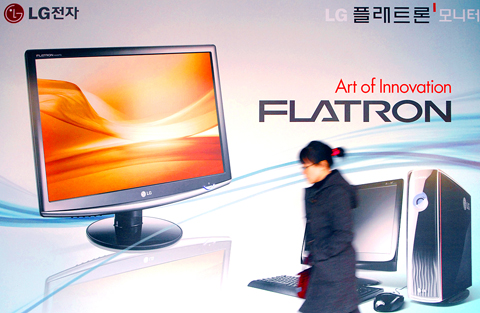LG Display Co., the world’s second-largest maker of liquid-crystal displays, reported its first loss in seven quarters after prices declined amid the global recession and the company booked a fine for conspiring to fix prices.
The fourth-quarter net loss was 684 billion won (US$504 million), compared with profit of 760 billion won a year earlier, LG Display said yesterday. Sales, including those of overseas affiliates, fell 3.8 percent to 4.16 trillion won.
LG Display, Sharp Corp and AU Optronics Corp (友達光電) cut output as the global recession erodes demand for flat-panel televisions and personal computers and panel prices slump. LG Display will probably stay unprofitable at least until the first half of this year because of weaker prices and demand, according to BNP Paribas SA, Credit Suisse Group AG and Citigroup Inc.

PHOTO: BLOOMBERG NEWS
“It’s still not the time to buy LCD shares,” said Ahn Sung-ho, an analyst at KB Investment & Securities Co in Seoul with a “hold” rating on LG Display. He spoke before the earnings were reported.
“Supply growth could accelerate again if panel prices stabilize, while demand remains weak,” he said.
LG Display was expected to report a loss of 574.5 billion won on sales of 3.99 trillion won, according to the median of 14 analyst estimates in a Bloomberg survey.
The company forecast the possibility of further price declines in the first quarter will be “limited” and said it will return to profit in March as industry prices recover.
The company will record an operating loss this month and next month, contributing to a first-quarter deficit “similar” to that in the last three months of last year, chief financial officer James Jeong said at a briefing in Seoul yesterday.

MORE VISITORS: The Tourism Administration said that it is seeing positive prospects in its efforts to expand the tourism market in North America and Europe Taiwan has been ranked as the cheapest place in the world to travel to this year, based on a list recommended by NerdWallet. The San Francisco-based personal finance company said that Taiwan topped the list of 16 nations it chose for budget travelers because US tourists do not need visas and travelers can easily have a good meal for less than US$10. A bus ride in Taipei costs just under US$0.50, while subway rides start at US$0.60, the firm said, adding that public transportation in Taiwan is easy to navigate. The firm also called Taiwan a “food lover’s paradise,” citing inexpensive breakfast stalls

TRADE: A mandatory declaration of origin for manufactured goods bound for the US is to take effect on May 7 to block China from exploiting Taiwan’s trade channels All products manufactured in Taiwan and exported to the US must include a signed declaration of origin starting on May 7, the Bureau of Foreign Trade announced yesterday. US President Donald Trump on April 2 imposed a 32 percent tariff on imports from Taiwan, but one week later announced a 90-day pause on its implementation. However, a universal 10 percent tariff was immediately applied to most imports from around the world. On April 12, the Trump administration further exempted computers, smartphones and semiconductors from the new tariffs. In response, President William Lai’s (賴清德) administration has introduced a series of countermeasures to support affected

CROSS-STRAIT: The vast majority of Taiwanese support maintaining the ‘status quo,’ while concern is rising about Beijing’s influence operations More than eight out of 10 Taiwanese reject Beijing’s “one country, two systems” framework for cross-strait relations, according to a survey released by the Mainland Affairs Council (MAC) on Thursday. The MAC’s latest quarterly survey found that 84.4 percent of respondents opposed Beijing’s “one country, two systems” formula for handling cross-strait relations — a figure consistent with past polling. Over the past three years, opposition to the framework has remained high, ranging from a low of 83.6 percent in April 2023 to a peak of 89.6 percent in April last year. In the most recent poll, 82.5 percent also rejected China’s

PLUGGING HOLES: The amendments would bring the legislation in line with systems found in other countries such as Japan and the US, Legislator Chen Kuan-ting said Democratic Progressive Party (DPP) Legislator Chen Kuan-ting (陳冠廷) has proposed amending national security legislation amid a spate of espionage cases. Potential gaps in security vetting procedures for personnel with access to sensitive information prompted him to propose the amendments, which would introduce changes to Article 14 of the Classified National Security Information Protection Act (國家機密保護法), Chen said yesterday. The proposal, which aims to enhance interagency vetting procedures and reduce the risk of classified information leaks, would establish a comprehensive security clearance system in Taiwan, he said. The amendment would require character and loyalty checks for civil servants and intelligence personnel prior to